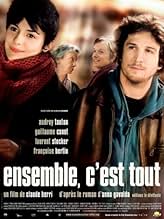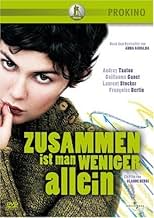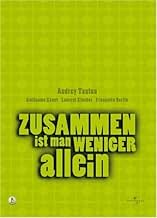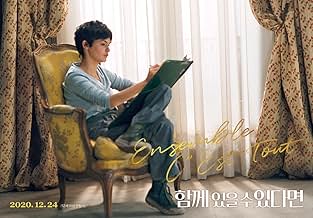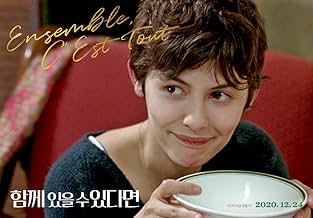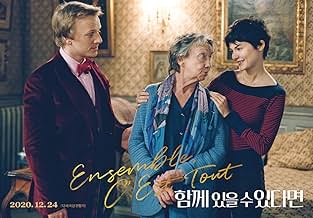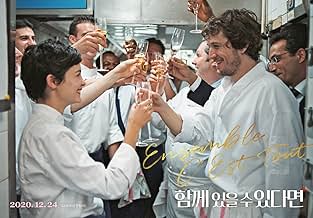VALUTAZIONE IMDb
6,7/10
12.789
LA TUA VALUTAZIONE
Quando Camille si ammala, è costretta a vivere con Philibert e Franck. Una commovente storia di trio.Quando Camille si ammala, è costretta a vivere con Philibert e Franck. Una commovente storia di trio.Quando Camille si ammala, è costretta a vivere con Philibert e Franck. Una commovente storia di trio.
- Regia
- Sceneggiatura
- Star
- Premi
- 3 vittorie e 5 candidature totali
Béatrice Michel
- Carine
- (as Beatrice Michel)
Hélène Surgère
- Yvonne
- (as Helene Surgere)
Danièle Lebrun
- Mère de Camille
- (as Daniele Lebrun)
Sandrine Mazéas
- Sandrine
- (as Sandrine Mazeas)
Recensioni in evidenza
I liked the film. Though it differs from the novel by Anna Gavalda. I imagined a bit another Franck, but Guillaume Canet is so charming, and I must admit that he perfectly fits his part. Audrey Tautou isn't the best Camille... but I'm used to her being the "prima ballerina" of the French cinema... I reckon that are Philibert (Laurent Stocker) and Franck (Guillaume Canet) who make the whole film worth watching. And of course I must admit Tautou's good acting. All the actors beautified the film. It's no use retelling the plot. It's not a detective story with millions of turns up. This film speaks about life. And you know, read the book first. That's my advice. The film isn't as good as its original. But nothing's perfect! And if you want to form your own opinion (not the director's one) about Camille, Franck, Philibert, Paulette...... both read and watch.
What a pleasant surprise this film turned out to be! After about 25 mins, i was totally hooked into this quartet of terrific, subtly drawn characters. What could have been a fairly stock- standard, 'everyone-comes-together-in-Paris' type of comedy-drama, is elevated by great performances (the always gorgeous Audrey Tautou and the impressive Guilliame Canet in particular), considered production design & a script that doesn't take the easy way out and continually defies your expectations.
Wholly charming, this is a great romantic fable, hugely fun, and should appeal to anyone who wants a thoughtful yet enjoyable trip to the cinema.
Wholly charming, this is a great romantic fable, hugely fun, and should appeal to anyone who wants a thoughtful yet enjoyable trip to the cinema.
In a nutshell, this film mainly reflects a love story between two ordinary people, who at first were both agonized by the realities they faced. There are many interwined little episodes that are also worth savoring. What is amazing about this film is that the depiction of several common people with their own life problems can emit such positivity as to encourage us to have a less bleak view of our own destiny.
"Hunting and Gathering" is the penultimate film of Claude Berri, the last tycoon of French cinema. He passed away before completing his final project but I like to think of that one as the last one made under his full artistic supervision because it's a fitting ending to a rich body of work and the subject poetically closes an arc traced by his first feature film "The Old Man and the Child" with Michel Simon...
There truly is a poignant and satisfying feeling of full circle with the theme of people who overcome isolation and find a ray of sunshine in their lives through the presence of others. It's as simple as that but sometimes it's within the simplicity of moments such as people sharing a meal, a drink, a conversation that faith in happiness can be revived. The film might never leave a indelible impression, it's not on par with Claude Berri's celebrated works such as "So Long, Stooge", or "Jean de Florette/ Manon des Sources" but it does leave the viewer with with a little smile in your face and a great deal of satisfaction.
There are four protagonists, all wonderfully played by their respective actors, I did believe in each of them though I must admit I had a hard time sympathizing with Guillaume Canet's Franck who plays the bad boy with a golden heart. It's not his performance but rather the way he was perhaps the most "obvious" of all. He's a young chef who takes care of his grandmother Paulette (Françoise Bertin) a woman in her eighties and whose declining health put her in a retirement home, far from her little house, her garden and her cats. Oh I'm digressing, I was talking about Franck. The offspring of a failed union, left by both his parents and raised by Paulette, he built a defensive hard-to-get attitude to preserve himself from deception and drowns his bitterness in beer and one-night stands... life for his meals, love is one thing to make, not enjoy.
Franck isn't the only one with demons, there's Camille played by Audrey Tautou. She doesn't see eye to eye with her mother and works as a janitorial worker, she's anorexic, smokes a lot and lives in one of these studios in the top of Parisian buildings (called 'maid's rooms' die to their extreme coziness. She's got nerves, a dry sense of humor and doesn't strike as the girl who believes in a Charming Prince but she knows good person when she sees one. An office worker leaves some of his garbage outside the basket, she leaves a savage note on his office, a kindly neighbor, Philibert (Laurent Stocker) addresses her politely, she just invites him to a little improvised dinner in her room. Why? Maybe because unlike Franck, she can't force herself to believe that she can live without a good company every now and then. And unlike Franck, it's not sexual and somehow she felt that Philibert wouldn't think so either.
Philibert is a man with aristocratic background written all over his particle name, he has a stammer, wears a shapka and dresses like a dandy from the 50s, whatever made him the roommate of Franck might be the only "plot convenience" we could close our eyes on... Anyway, it all leads down to a night where Camille falls sick and Philibert takes her to her apartment, she needs a few day to recover and eventually meet Franck. Now. I still remember my initial feeling, I was so moved by the duo formed by Camille and Philibert that I felt like the film would lose its mindless charm if it had to surrender the something as formulaic as "boy meets girl - they hate each other - they fall in love" etc.
Well, it's a foregone conclusion that the two will fall in love but Berri's film doesn't care about clichés as much as it doesn't care about avoiding them . And no matter what, the film is less about two people who found love, than four people who found a certain state of grace once they opened their doors and therefore their hearts to each other... Philibert overcomes his handicap and pursue theater courses and finds love on stage... Paulette is hosted by her grandson and taken care of by Camille... and Camille and Franck, tease each other, resist the idea of falling in love to better throw themselves in. But again, love is less a plot device than a collateral healing.
We know that some facts of life will take their rights back but there's never a sense of major threat or some existential obstacle, it's just as if Berri knowing each film could be the last decided to free himself from that 'need of social relevance' like in his earlier movies ... We live in a world that is a constant temptation for isolation and cynicism and that the very director of "So Long, Stooge" with Coluche, could compose that hymn for togetherness can almost look utopian or naïve, but if such scenarios were that implausible, would the world really be worth to live?
Why couldn't an old woman die peacefully in the place she loved? Why would a man with a stutter not become an acclaimed comedian? Why wouldn't professional success be compatible with true love? In "The Old Man and the Sun", an old prejudiced man hid a little Jewish boy. He didn't know about his identity but it didn't matter, the kid became his best friend and the old man's soul was cleaned up. The stakes are lower in "Hunting and Gathering", no life-and-death situation, but the spirit is the same: maybe one of the key to happiness is to meet people who make us want to become better.
There truly is a poignant and satisfying feeling of full circle with the theme of people who overcome isolation and find a ray of sunshine in their lives through the presence of others. It's as simple as that but sometimes it's within the simplicity of moments such as people sharing a meal, a drink, a conversation that faith in happiness can be revived. The film might never leave a indelible impression, it's not on par with Claude Berri's celebrated works such as "So Long, Stooge", or "Jean de Florette/ Manon des Sources" but it does leave the viewer with with a little smile in your face and a great deal of satisfaction.
There are four protagonists, all wonderfully played by their respective actors, I did believe in each of them though I must admit I had a hard time sympathizing with Guillaume Canet's Franck who plays the bad boy with a golden heart. It's not his performance but rather the way he was perhaps the most "obvious" of all. He's a young chef who takes care of his grandmother Paulette (Françoise Bertin) a woman in her eighties and whose declining health put her in a retirement home, far from her little house, her garden and her cats. Oh I'm digressing, I was talking about Franck. The offspring of a failed union, left by both his parents and raised by Paulette, he built a defensive hard-to-get attitude to preserve himself from deception and drowns his bitterness in beer and one-night stands... life for his meals, love is one thing to make, not enjoy.
Franck isn't the only one with demons, there's Camille played by Audrey Tautou. She doesn't see eye to eye with her mother and works as a janitorial worker, she's anorexic, smokes a lot and lives in one of these studios in the top of Parisian buildings (called 'maid's rooms' die to their extreme coziness. She's got nerves, a dry sense of humor and doesn't strike as the girl who believes in a Charming Prince but she knows good person when she sees one. An office worker leaves some of his garbage outside the basket, she leaves a savage note on his office, a kindly neighbor, Philibert (Laurent Stocker) addresses her politely, she just invites him to a little improvised dinner in her room. Why? Maybe because unlike Franck, she can't force herself to believe that she can live without a good company every now and then. And unlike Franck, it's not sexual and somehow she felt that Philibert wouldn't think so either.
Philibert is a man with aristocratic background written all over his particle name, he has a stammer, wears a shapka and dresses like a dandy from the 50s, whatever made him the roommate of Franck might be the only "plot convenience" we could close our eyes on... Anyway, it all leads down to a night where Camille falls sick and Philibert takes her to her apartment, she needs a few day to recover and eventually meet Franck. Now. I still remember my initial feeling, I was so moved by the duo formed by Camille and Philibert that I felt like the film would lose its mindless charm if it had to surrender the something as formulaic as "boy meets girl - they hate each other - they fall in love" etc.
Well, it's a foregone conclusion that the two will fall in love but Berri's film doesn't care about clichés as much as it doesn't care about avoiding them . And no matter what, the film is less about two people who found love, than four people who found a certain state of grace once they opened their doors and therefore their hearts to each other... Philibert overcomes his handicap and pursue theater courses and finds love on stage... Paulette is hosted by her grandson and taken care of by Camille... and Camille and Franck, tease each other, resist the idea of falling in love to better throw themselves in. But again, love is less a plot device than a collateral healing.
We know that some facts of life will take their rights back but there's never a sense of major threat or some existential obstacle, it's just as if Berri knowing each film could be the last decided to free himself from that 'need of social relevance' like in his earlier movies ... We live in a world that is a constant temptation for isolation and cynicism and that the very director of "So Long, Stooge" with Coluche, could compose that hymn for togetherness can almost look utopian or naïve, but if such scenarios were that implausible, would the world really be worth to live?
Why couldn't an old woman die peacefully in the place she loved? Why would a man with a stutter not become an acclaimed comedian? Why wouldn't professional success be compatible with true love? In "The Old Man and the Sun", an old prejudiced man hid a little Jewish boy. He didn't know about his identity but it didn't matter, the kid became his best friend and the old man's soul was cleaned up. The stakes are lower in "Hunting and Gathering", no life-and-death situation, but the spirit is the same: maybe one of the key to happiness is to meet people who make us want to become better.
I liked this film. The French formula for romantic comedy doesn't depend on the characters being rich, young and handsome, an opulent setting , and no old people (except for very minor characters). French directors find romance in the humbler areas of Paris as well as the flashier parts. Camille (Audrey Tautou), an art school dropout, works as a cleaner, or "surface engineer" as she likes to be called. She lives in a garret in the same old apartment building as Philibert (Laurent Stocker), who is young and good-looking, but is the French equivalent of a dim gentleman. Philibert sells postcards for a living. Notwithstanding a stutter, he aspires to a career on the stage. He shares his rather grand but dowdy apartment, his grandmother's former home, with the gruff Franck (Guillaume Canet), a womanizing chef. Franck is pre-occupied with looking after his elderly grandmother Paulette (Francoise Bertin), who is hospitalized after a fall. When Camille falls ill Philibert invites Camille to convalesce at his place. Soon she is striking sparks off grumpy old Franck.
Philibert isn't gay; it's just that his romantic interests lie elsewhere. It is Pauline who draws Franck and Camille together. The French title "Ensemble C'est Tout" ("Together, That's All") says it all, really. (I haven't a clue what this film has to do with hunting and gathering).
Audrey Tautou has just about got the market for sexy French waifs sewn up. I've seen her in several other films and her performances are similar. Guillaume Canet lets us see his gruff chef's soft side and Francoise Bertin also evokes sympathy for someone made tiresome by old age. The part of Philibert's love interest Aurelia is severely truncated (the result of putting a 600 page novel into 100 minutes of film). This also tends to sideline Philibert later in the film.
I very much liked Jean de Floriet and Manon des Sources, directed by Claude Berri 20 years ago (two other literary adaptations). He is a very conservative, straightforward director, but he can produce some very vivid work. One very touching scene here is when Philibert goes to a speech therapist to cure his stutter. The therapist, Phillipe van Eeckhout, is one in real life and treated Berri after a recent stroke damaged his speaking ability.
So, we have no glamorous stars (though Audrey Tautou is big in France) and no shimmering background. But it's a warm-hearted story with some real emotion and, dare I say it, a happy ending. And here's something for the nit-pickers. Franck would never have got to London from the Gare du Lyon (except via the connecting suburban RER line). Paris - London trains leave from the magnificent Gare du Nord. But who cares?
Philibert isn't gay; it's just that his romantic interests lie elsewhere. It is Pauline who draws Franck and Camille together. The French title "Ensemble C'est Tout" ("Together, That's All") says it all, really. (I haven't a clue what this film has to do with hunting and gathering).
Audrey Tautou has just about got the market for sexy French waifs sewn up. I've seen her in several other films and her performances are similar. Guillaume Canet lets us see his gruff chef's soft side and Francoise Bertin also evokes sympathy for someone made tiresome by old age. The part of Philibert's love interest Aurelia is severely truncated (the result of putting a 600 page novel into 100 minutes of film). This also tends to sideline Philibert later in the film.
I very much liked Jean de Floriet and Manon des Sources, directed by Claude Berri 20 years ago (two other literary adaptations). He is a very conservative, straightforward director, but he can produce some very vivid work. One very touching scene here is when Philibert goes to a speech therapist to cure his stutter. The therapist, Phillipe van Eeckhout, is one in real life and treated Berri after a recent stroke damaged his speaking ability.
So, we have no glamorous stars (though Audrey Tautou is big in France) and no shimmering background. But it's a warm-hearted story with some real emotion and, dare I say it, a happy ending. And here's something for the nit-pickers. Franck would never have got to London from the Gare du Lyon (except via the connecting suburban RER line). Paris - London trains leave from the magnificent Gare du Nord. But who cares?
Lo sapevi?
- QuizCharlotte Gainsbourg was originally cast as Camille.
- Versioni alternativeThere are two different versions, although the runtimes are the same: "1h 37m (97 min)" and "1h 37m (97 min) (European Film Market) (Germany)".
I più visti
Accedi per valutare e creare un elenco di titoli salvati per ottenere consigli personalizzati
- How long is Hunting and Gathering?Powered by Alexa
Dettagli
Botteghino
- Lordo in tutto il mondo
- 31.927.276 USD
- Tempo di esecuzione1 ora 37 minuti
- Colore
- Mix di suoni
- Proporzioni
- 1.85 : 1
Contribuisci a questa pagina
Suggerisci una modifica o aggiungi i contenuti mancanti

Divario superiore
By what name was Semplicemente insieme (2007) officially released in India in English?
Rispondi

